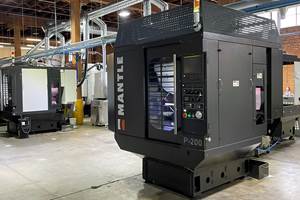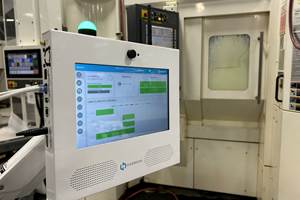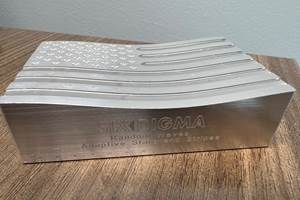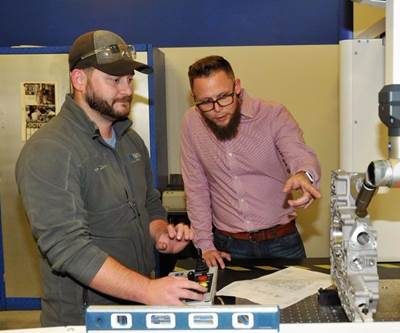Stay Positive Regarding Our Future Workforce
The future of machining relies on our success in attracting and retaining a skilled workforce.
Share





.png;maxWidth=45)
DMG MORI - Cincinnati
Featured Content
View More
Hwacheon Machinery America, Inc.
Featured Content
View More
Takumi USA
Featured Content
View More
We need to break the cycle of “doom and gloom.” We can recognize that our industry is facing hiring challenges while taking steps to do something about it.
I’m quite certain everyone reading these words is well aware of the lack of qualified, skilled and productive employees in the workplace. You are dealing with that reality every day. The reasons are myriad. Blame the skills gap, the global economy, our school system or even millennials (I don’t blame them) if you wish. We all have a great many stories involving new hires who can’t seem to come to work every day or can’t seem to run at rate. When they actually do make parts, they don’t meet tolerance. We label these individuals with various negative descriptors. Some we call untrainable, others non-caring, and then there are the ones we simply call lazy. While it’s obvious that these workers have a negative impact on productivity and quality, I’m seeing a more worrisome problem developing in machine shops. It’s that owners like myself, general managers, lead people and frontline supervisors are becoming more jaded, cynical and skeptical toward potential job candidates and new hires.
It’s time for our industry to realize we need to build future employees, because we are no longer able to take out a help wanted ad and buy them.
Trust me, I get it. The frustration has been building for some time now. Over the last two years, I’ve interviewed and hired more than 30 employees, many of whom showed hope and promise early on, but ultimately didn’t work out. Shop leadership and long-term employees ask me why I don’t just find “better workers,” as though I am somehow avoiding good workers on purpose! I reply with, “We are hiring from the same talent pool as every other shop and doing the best we can.” But are we? So while everyday experiences seem to validate our frustration, our conversations now seem to reinforce it. Talks with our cutting tool salesperson, steel supplier and local machine tool dealer all revolve around the fact that it’s impossible to find “good employees,” and after we share our tales of woe, they relay how they hear the same thing over and over at every shop they visit.
We need to break this spiral of doom and gloom. I’m not asking everyone to suspend reality and pretend we are not facing some serious challenges, but I am asking that everyone begin to become engaged and take action in a way that may not have been necessary with past generations. Where we find employees, how we train them and the way we interact with them on a daily basis will require new ways of thinking. I include myself in this challenge.
Let’s ask ourselves a few questions:
- Are you considering individuals who may not have taken the conventional path to a career in manufacturing? Someone with solid character, work ethic and attitude that you can train, may very well end up as the better employee in the long run.
- Have you considered diverse candidates with backgrounds different than your own? Are you willing to embrace those individuals?
- Are you actively reaching out and engaging young people either by visiting your local schools or hosting student events at your workplace?
- Do you have a robust interview process that seeks to learn about the candidate and inform them about your business, the role they would play, as well as job expectations?
- Are you treating new hires as individuals? Do you and current employees show some level of understanding, caring and compassion toward them as they are trying to progress on the job?
- Do you have an onboarding plan to engage and connect with new employees?
- Do you have a robust training program? Are current team members who have been with you the longest sharing their knowledge and work experience, or do they see it as a waste of time, “since this person probably won’t work out or listen to my advice anyway?”
- We all seem to know how to give negative feedback. How much positive feedback is provided to new team members? Are you looking for the positive?
- Have you told your team how much the future depends on the ability to attract and retain new talent?
- Have you set up incentive programs that encourage current employees to grow and develop the next generation of workers?
It’s time for our industry to realize we need to build future employees, because we are no longer able to take out a help wanted ad and buy them. It may not seem like the ideal situation, but it is our reality. And, yes, it will involve effort and hard work. But, since the future of machining relies on our success in attracting and retaining a skilled workforce, what other choice do we really have?
About the Author
Thomas G. Marini
Tom is the president and CEO of Marini Manufacturing, which was founded in 1952 as a small machine shop and has since grown into a modern provider of precision-machined components and assemblies. More at marinimfg.com.
Related Content
The Power of Practical Demonstrations and Projects
Practical work has served Bridgerland Technical College both in preparing its current students for manufacturing jobs and in appealing to new generations of potential machinists.
Read MoreIn Moldmaking, Mantle Process Addresses Lead Time and Talent Pool
A new process delivered through what looks like a standard machining center promises to streamline machining of injection mold cores and cavities and even answer the declining availability of toolmakers.
Read MoreCan Connecting ERP to Machine Tool Monitoring Address the Workforce Challenge?
It can if RFID tags are added. Here is how this startup sees a local Internet of Things aiding CNC machine shops.
Read MoreBuilding Machines and Apprenticeships In-House: 5-Axis Live
Universal machines were the main draw of Grob’s 5-Axis Live — though the company’s apprenticeship and support proved equally impressive.
Read MoreRead Next
Are You Irreplaceable?
By delegating certain tasks to a reliable second-in-command, your company can succeed without your constant attention, and you can pursue other goals as well.
Read More5 Rules of Thumb for Buying CNC Machine Tools
Use these tips to carefully plan your machine tool purchases and to avoid regretting your decision later.
Read More

















































